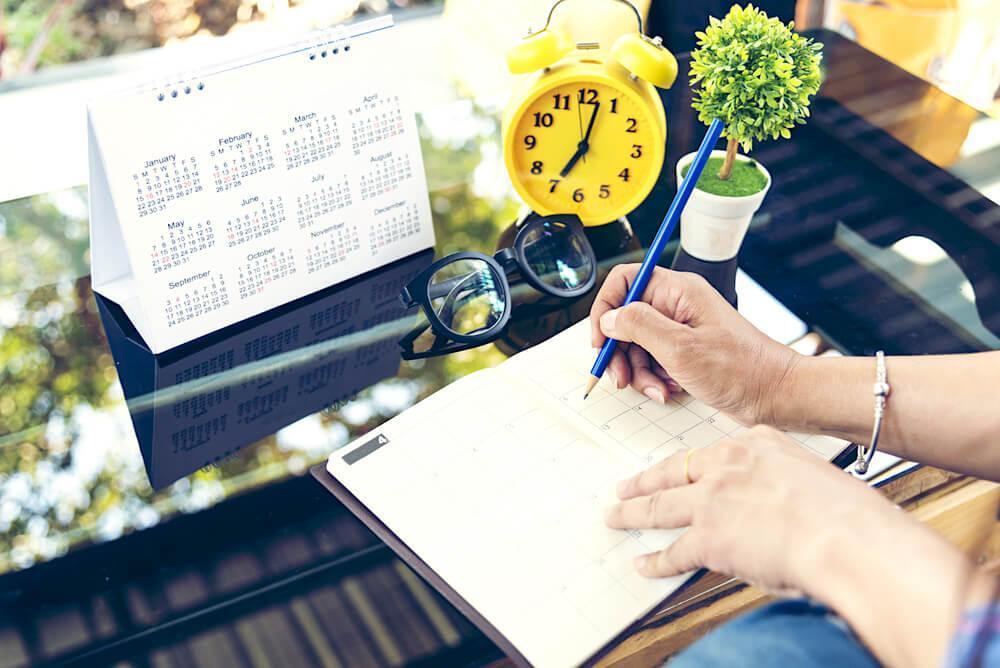Between work deadlines, household chores, online distractions, and those endless PTA meetings — how’s a person supposed to keep on top of it all? We’re lucky if we’re not crashing out by 9 p.m.!
If this sounds like you, and you’re struggling to keep your energies up throughout the day, we have a few tips you might find useful.
Wake Up Early
As painfully obvious as this advice may sound, waking up early still presents a daily struggle for a lot of people.
This is especially the case when we aren’t motivated by an immediate necessity (i.e. not being late for work).
However, when it comes to fulfilling your daily goals, walking up early can sometimes be half of the battle.
Some people are early birds, so waking up even at the break of dawn won’t be a problem for them.
For others, however… this may be a challenge.
If you aren’t a natural early riser, here are some tips to help you overcome the pain of getting out of the warm, comfy bed:
- Keep your phone or alarm out of arm’s reach – this way you’ll have to physically get up if you want to secure that precious snooze time;
- Stretch first, social media later – if you reach out to check your phone, chances are you’ll stay longer in bed; it’s best to get up and do few quick body stretches before checking that phone;
- Instead of your pajamas, try sleeping in comfortable workout gear – this way, you’ll be ready to dive right into your fitness routine first thing in the morning.
Once you’re up and running, make a point of making your bed right afterwards. If you postpone doing so, you might be tempted to jump back into the sheets. Plus, the mere act of making the bed will instantly make you feel more put-together and ready to conquer the day.
Squeeze in a Workout
Suggesting exercise as a means to feel more energized might feel counterintuitive to you at first, but there is a good reason why introducing a dose of fitness into your daily routine should be among your top priorities.
For starters, studies show that exercising can accelerate the production of mitochondria, a component that creates chemicals your body and your brain use for energy.

In plain terms, this means that even a short morning workout will make your mind sharper and your body more invigorated.
Turn working out into a habit and, over time, you might slow down the processes that cause your brain cells to die out as you grow older – meaning that exercise will not only be beneficial for your physical, but also mental capabilities.
If your day-to-day schedule tends to be erratic, you might find it challenging to fit a workout routine in between all the other tasks.
However, you don’t need become a full-on gym rat to improve your fitness level.
If a gym membership is a no-go for financial or any other reasons, you can always turn to YouTube – where you will find a plethora of channels that offer step-by-step workouts for every level.
Set Up a Balanced Diet
Maintaining a good diet is, without a doubt, one of the biggest challenges for people who lead busy lives.
Moreover, setting aside an hour or two to organize replenishing, healthy meals will usually be the first thing we sacrifice in an effort to save more time.
This is also not helped by the fact that quick, less-than-healthy options seem to be bombarding us from all sides.
Even worse, if your work is sedentary and involves spending hours in front of a screen, you might find yourself craving the worst kind of food as the day progresses.
Why does this happen?
And, more importantly, how do you fix it?
There is simple science behind this phenomenon.
All the food you eat during the day is transformed into glucose in your body.
Glucose is the substance that keeps you focused and concentrated.
This explains why, when you are running low on glucose, your concentration drops and your thoughts being to wander.
Refined sugar and carb-laden foods like chocolate and pasta will equip you with that abrupt jolt of energy, but this is usually followed by a slump and return to feeling even more fatigued than before.
To combat this vicious cycle, try to plan your meals ahead, with a focus on healthy alternatives.
This doesn’t have to require a lot of effort – simple things like switching from chips and chocolate to fruits and nuts will do wonders for your concentration and efficiency.
You should also keep in mind that establishing healthy eating habits doesn’t only entail what you eat, but also how you eat it.
For example, you shouldn’t wait until you’re absolutely starving until you finally sit down to eat. When you’re famished, it’s much easier to slip and go for the unhealthy, instantly filling processed food.
Also, try not to eat in front of screens or surround yourself with distractions during your meals. Mindful eating will help you concentrate on the smell, taste and texture of the food, making you feel more sated and satisfied.
Tidy Up
The clutter in your mind can sometimes also be reflected in your immediate surroundings.
That’s why there’s no better way to kick-start your productivity than by transforming your workspace into a clean canvas.
Whether you work from home or an office, maintaining clean and organized environment can help boost your efficiency and creativity in numerous ways.

For one, if your immediate workspace (e.g. desk) is piled with papers, letters and other stuff, this sight alone can make you feel discouraged and lead you to procrastinate.
De-cluttering your workspace and removing all the objects you don’t use day-to-day will minimize the distractions and help you focus on your work, and your work only.
Organizing your space will also help you save time: if you need something, it will become much easier to instantly locate it, rather than spending hours rummaging through your cabinets and drawers.
Even the mere process of tidying up and “setting the stage” for work can do wonders for improving your work or creative output.
The simple act of cleaning provides a sense of accomplishment and mentally prepares you for the work ahead.
Avoid Electronics Before Bedtime
Admit it, how many times have you fallen asleep while browsing the web on your phone, only to be abruptly awakened seconds later as it falls on the floor?
If the answer is more than “zero”, then you might want to reconsider your pre-bedtime habits.
This means staying away from all electronic devices at least one hour before going to sleep.
Why will this make a difference?
Well, for starters, there is a perfectly reasonable scientific argument for this: black and white light that is emitted from our tablets and phones prevents your brain from releasing melatonin, which signals your body that it’s time to sleep.
Moreover, the visual stimulus you get from indulging in social media may only further frazzle your brain.
Instead of turning to the online world, try centering yourself before falling asleep.
To feel extra comfy under the sheets, you might want to take a warm bath or shower just before bedtime. This will slow down your metabolism and alert your body that it’s time to sleep.
While you’re lying in bed, try to focus on your body and consciously relax your muscles. You can also try a few simple breathing techniques that will help you unwind and clear your mind.
Once you master these techniques, you will drift to sleep in no time.
Plan Out Your Day
Even if you do follow all the aforementioned advice, no amount of healthy meals and early mornings will be any good if you waste away your day by constantly delaying tasks.
And, as if procrastination wasn’t annoying enough on its own, now we also have the world of entertainment and social media at our fingertips at all times, making it even harder to avoid distractions.
However, there are ways to break the dreaded time-wasting cycle and focus instead on the work in front of you.
For example, if you plan out your day in advance, it will be much harder to slip up and end up delaying your projects.

And if you’re not sure where to begin, here are some tips on how to time-manage your daily routine:
- Determine all the tasks you want to complete in a day, keeping your goals realistic;
- Jot them down on a piece of paper or in your planner – visual representation will make the goals clearer;
- Note the amount of time you predict will take to complete each task – this will help you stay on track;
- Don’t beat yourself up if you’re not exactly on schedule; simply move onto the next task instead of ditching your to-do list altogether.
This kind of time management might require some practice at first, but once you master it, you will be amazed at how much more you can do in a day when you’re not postponing your projects.
Stay Hydrated
“Drink more water” seems to be a foolproof advice in a myriad of different contexts.
But precious H2O is especially important if you’re trying to be more active in your day-to-day life.
Here’s why this is the case:
When we’re deprived of water, our muscles become more prone to soreness, which then causes you to feel more tired and devoid of energy.
Not only that, but dehydration also impedes on your cognitive and motor skills – so, when you are thirsty, you are more likely to drift off or make errors in your work.
When you’re parched for fluids, you may also find yourself becoming increasingly stressed or moody.
And yet, it’s so easy to go hours without drinking water and not even realizing how thirsty you are.
So, how do you step up your hydration game?
You can do this by investing in a reusable water bottle that you can carry and sip from wherever you are.
Alternatively, you can set an alarm every one or two hours that will remind you to increase your water intake.
Go Outside
Sometimes, the best thing you can do for your productivity is allowing yourself to have a break.
And when you do have a time-out from work and other projects, make sure to surround yourself with nature, if only for a short while.

Why is this important?
Well, studies show that exposure to green spaces can have a positive impact on your mood, reduce stress levels and relieve depression.
Being amidst greenery will help you relax and replenish your energy reserves.
Moreover, exposing yourself to sun rays may do wonders for your creativity and productivity, especially during winter months.
Sun exposure will help perk up your Vitamin D levels, which are crucial for battling sluggishness and cranky mood that occurs during cold months.
Even ten minutes of direct sunlight a day will help replenish your body with Vitamin D, improving your mood and eradicating the winter slump.
We hope these energy-boosting tips prompt you make the first steps towards building a more wholesome, efficient daily routine. Now it’s time to get your brain into gear and finally start making better choices for your body and your mind.






Leave A Comment